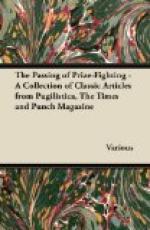It is an ancient Mariner,
And he stoppeth one of three.
“By thy scant gray looks and glittering
eye,
Now wherefore stopp’st thou me?”
“St. Stephen’s doors are open
wide,
My duty lies within;
M.P.’s are met, the programme’s
set,
May’st hear the Irish din.”
He holds him with his sinewy hand,
“There was a ship,” quoth
he.
“Hold off! unhand me, Ancient One!”
Eftsoons his hand dropt he.
[Sidenote: St. Stephen’s Guest is spell-bound by the eye of the Grand Old Seafaring Man, and constrained to hear his tale.]
He holds him with his glittering eye—
St. Stephen’s Guest stands still,
And listens, like Midlothian’s mob.
The Mariner hath his will.
St. Stephen’s Guest stands like
a stone.
He cannot chuse but hear;
And thus outspeaks that ancient man,
The bright-eyed Mariner.
Our ship was cheered, the harbour cleared
Merrily did we drop
Below the Kirk, Tory ill-will
Our vessel might not stop.
[Sidenote: The Mariner tells how his new-launched Craft, after some adverse gales, sailed northward, with a good wind, and fair weather.]
The sun arose, that erst had left
Our Home-Rule argosy,
And he shone bright, our course was right,
The “flowing tide” ran free.
Higher and higher every day
Our sun shone bright and clear—
St. Stephen’s Guest here beat his
breast,
For he heard the loud “Hear!
Hear!”
[Sidenote: St. Stephen’s Guest heareth that business is toward within; but the monologuising Mariner continueth his tale.]
The Speaker hath paced into the House,
Toward his lofty place;
Gleaming like gold before him goes
The merry, massive Mace.
St. Stephen’s Guest he beat his
breast,
Yet he could not chuse but hear;
And thus spake on that ancient man,
The garrulous Mariner.
[But behold the tale that was told unto St. Stephen’s Guest by the Ancient Mariner is now known unto all men, from repeated and prolix narrations; the tale to wit of the Mariner’s startling adventure in unsailed seas on board his suddenly launched Home Rule Argo; how that the Ancient Mariner shot the Oof Bird (that made the (financial) mare to go, and the (party) breeze to blow); how that his shipmates cried out against the Ancient Mariner for killing the bird of good luck, which lay the golden eggs, but how, when the fog cleared off, they justified the same, and thus made themselves accomplices in the act; how “the spell began to break;” how “the Mariner hath been cast into a trance, and the angelic power” (of speech) “causeth the vessel to drive northward faster than” (ordinary) human “life could endure”; how in the Mariner’s opinion the Home Rule Argo yet “stoppeth the way,” and until it hath free course must impede the fair navigation of the (political) ocean; and how, finally, he, the Ancient Mariner, is constrained to “pop up” and repeat this tale of change and chance unto the appointed persons.]
* * * * *




